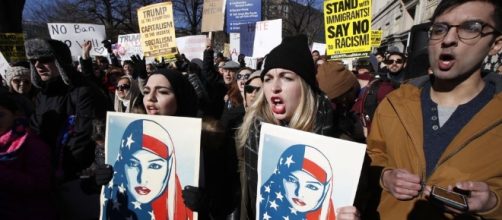Made up entirely of judges appointed by former Democrat President Bill Clinton, a three-judge 9th U.S. Circuit court of appeals panel will review Hawaii's ruling to block Republican President Donald Trump's revised travel ban.
The Court of Appeals will hear arguments on Monday and will be the second court to review the president's directive over the past week.
Trump's first travel ban
Trump's first attempt at crafting a travel ban focused on six-Muslim countries was issued on January 27. Before being blocked by courts, the Trump's travel restrictions led to protests and confusion at all major U.S.
airports.
The President's second order was an attempt to overcome any legal problems that came up because of his original ban. But, in spite of a short suspension by judges, the ban went into effect on March 16.
90-day block imposed
A 90-day block to Trump's March 16 travel ban was imposed by a U.S. District Judge in Hawaii, Derrick Watson. The president's restrictions were placed on people coming into the U.S. from Yemen, Libya, Somalia, Sudan, Syria, and Iran.Part of the order also put restrictions on refugee applications – but Judge Watson suspended that ban for 120 days.
Part of Trump's order also put restrictions on refugee applications – but Judge Watson suspended that ban for 120 days.
4th U.S. Court of Appeals
Maryland's 4th U.S. Circuit Court of Appeals, last week, reviewed a judge's ruling blocking the 90-day entry restrictions. Democrats make up the majority of judges in Virginia, so it appeared that questioning broke along partisan lines. They have not released a ruling, yet.
Donald Trump's argument that America needs stricter national security measures, prompted his first major act since taking office – placing travel restrictions on people traveling into the U.S.
from mostly Muslim countries.
Trump is testing the waters
Testing the waters with his travel ban, the success of his stance on tougher immigration and strengthening national security remains to be seen
Civil rights groups, the state of Hawaii and opponents of Trump's ban argue that both the first travel ban and the revised ban discriminate against people traveling into the United States from Muslim countries.
The need to protect the U.S.
Trump's argument, as stated in his executive order to restrict Muslims from entering America, does not specify any religion only that it is needed to protect the U.S. from any and all attacks.
The ultimate decision will come from the U.S. Supreme Court. The judges for the 9th Circuit will hear the case on Monday in Seattle, but the high court isn't expected to review the issues for several months.


